TODAY’S READING FROM THE OLD TESTAMENT- 2 SAMUEL 4:1-6:23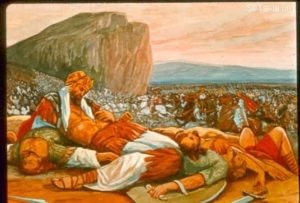
Saul and his eldest three sons were killed in battle at Mount Gilboa (1 Samuel 31:2; 2 Samuel 1:5-6). Ishbosheth, Saul’s fourth son, and oldest surviving son, had been proclaimed Saul’s successor, King of Israel, by Abner, Saul’s cousin, and commander in chief. Abner defected and joined David who is now King of Judah, when Ishbosheth charged him with having sex with Rizpah, his deceased father’s concubine. Apparently sexual intercourse with a member of the harem of a dead king was a way of laying claim to the throne. We don’t know whether the charge against Abner was true. Ishbosheth certainly believed it. Abner was offended by it and therefore in retaliation he turns against the new King Ishbosheth and pledges to help transfer the kingdom from the house of Saul to the house of David. David’s commander, Joab, does not know that Abner has made peace and pledged his allegiance to David. Thinking he is still David’s enemy, Joab kills Abner.
When Ishbosheth learns of Abner’s death, he is disheartened, and all Israel is alarmed. They have no strong leader in their midst.
‘Ish’ means ‘man’ in Hebrew. ‘Bosheth’ means ‘shame’. Ish-bosheth’s name was originally, ‘Ish-baal’ meaning ‘man of the master’ (1 Chronicles 8:33), but because ‘Baal’ was more often associated with Canaanite fertility gods, Hebrew editors substituted ‘baal’ with ‘bosheth’. In many ways he is a ‘son of shame’ and the last in the line of Saul to be king.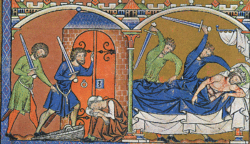
Two leaders of David’s raiding bands, Recab and Baanah, murder Ishbosheth while he is taking a nap. They cut off his head and take it to David, thinking that he would be pleased. Instead David is outraged that the son of King Saul would be treated this way and orders that his raiding band leaders be put to death. Their bodies were hung in public as a warning. Out of respect, Ishbosheth’s head is buried in Abner’s tomb.
David is finally installed as king of all of Israel in 2 Samuel 5. We learn that David is now 30 years old, having reigned over Judah for 7 years and 6 months. In Jerusalem he will reign for 33 years.
Up until now, the Jebusites have been able to hold Jerusalem. David is successful in capturing the fortress in Zion. Jerusalem has been known as the city of David ever since (2 Samuel 5:9).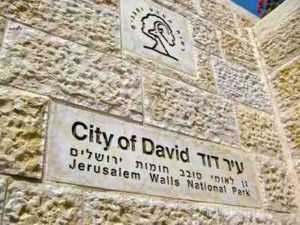
Jerusalem is located on the mountains of Moriah, where Abraham went to worship the Lord, and in obedience prepared to offer God the sacrifice He required- that of His promised son (Genesis 22). When Isaac willingly cooperated with his father and laid himself on the altar, the angel of the Lord, having seen the devotion of the two, stopped the sacrifice and announced the good news that God Himself would provide the sacrifice, or as it is translated ‘God will provide Himself as a sacrifice on the mountains of Moriah (‘seen of God’). The place was named ‘Yahweh Jireh’, ‘the Lord will provide’ (Genesis 22:14). There in Jerusalem centuries later, God the Father would provide His Son as a perfect sacrifice on the cross at Calvary.
The plot advances towards that end as Jerusalem is conquered and becomes the dwelling place of the thrice-anointed King, a foreshadowing of the dwelling place of the Greater David, the Lord Jesus, who will reign there in righteousness. He will reign in and above Jerusalem. He is the Light and temple of the New Jerusalem.
David disobeys God’s Word in Deuteronomy 17:17 and takes multiple wives. We learn of 12 of his children (2 Samuel 5:13).
David is more careful to inquire of the Lord about going into battle with the Philistines than he is about choosing wives.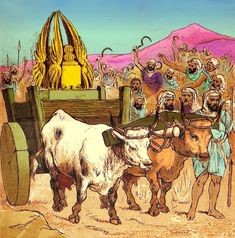
Now that David is established in Jerusalem and in the process of building a palace, he sets out to bring the Ark of the covenant from the house of Abinadab to Jerusalem. Big mistakes are made here. According to the Word of God, the Ark was to be carried by the Kohathite priests who would bear it on two staves of gold-plated wood. This is a picture of the presence of the Lord being born about by believer priests by means of a personal cross, (personally identifying with Christ in His death, burial, and resurrection). Here however they try a ‘Philistine upgrade’. Instead of an old-fashioned cross, they have a new Philistine cart. David and the whole house of Israel are worshiping whole-heartedly. But trouble occurred when they came to the threshing floor of Nacon. The oxen stumble and Uzzah reaches out to steady the Ark. He violates God’s holy protocol. The presence of God cannot be manipulated or controlled by any man. “The Lord’s anger burned against Uzzah because of his irreverent act.” (2 Samuel 6:7). God strikes him dead.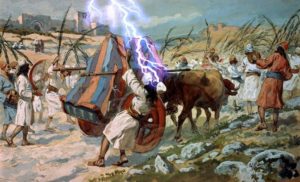
David is angry because of God’s anger! David is thinking twice about bringing the Ark to Jerusalem and reroutes it to the house of Obededum, where it brings blessing to Obededum’s household for three months.
When David sees how God has blessed Obededum, he wants to have the Ark back. He brings it back to Jerusalem with great rejoicing. It appears that the Ark is now being carried according to God’s revealed will in Scripture. Good call! David, wearing a linen ephod, dances before the Lord with reckless abandon. His wife, Michal, Saul’s daughter, does not appreciate his enthusiasm, thinking it beneath his stately office.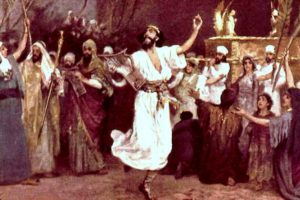
David defends his actions as being honorable to the Lord, no matter how it appeared in the eyes of others.
It is clear that David and his wife, Michal, are not on the same wavelength. It comes as no surprise that Michal bore no children to the day of her death.
TODAY’S READING FROM THE NEW TESTAMENT – JOHN 13:31-14:14
The Upper Room Discourse continues. The radical nature of Jesus’ command to His disciples should not be missed. He gives each of us an accurate reference of what love in action looks like.
John 13:34-35 34 “A new commandment I give to you, that you love one another, even as I have loved you, that you also love one another. 35 “By this all men will know that you are My disciples, if you have love for one another.”
Simon (whose name means ‘reed’, one that easily blows in the wind) is also named Peter (meaning ‘rock’, something solid and reliable). Simon Peter presumes his reliability prematurely. He pledges to be allegiant to Jesus, even to the point of sacrificing his life for Him. Jesus tells him the harsh truth about his ‘Simon’ nature. “Before the cock crows, you will disown me three times.”
Jesus gives what would have been recognized by his disciples as a customary Israeli marriage betrothal speech. The young man would pour a cup of wine and make a betrothal speech to his intended spouse, saying to the effect, “In my Father’s house there are many rooms, if it were not so I would have told you. (Sons would dwell on their family’s allotted land, building an addition on to the Father’s house). I am going there to prepare a place for you (a marriage chamber). And if I go and prepare a place for you, I will come back and take you to be with me that you also may be where I am” (John 14:2-4).
Jesus had spoken about the new covenant being inaugurated by His death. The bridal imagery is clear when Jeremiah first speaks of the new covenant (Jeremiah 31:31).
Jesus claims to be “The Way” to the Father, not merely “a way”. He is also “The Truth” about the Father. He says, “He who has seen me, has seen the Father.” Jesus is the visible, tangible, perfect image of God. He is man- as He, as God, made man to be– a perfect reflection of God’s moral nature, completely uninhabited by sin, and fully filled and flooded with the Holy Spirit.
TODAY’S READING FROM THE BOOK OF PSALMS – PSALM 119:17-32
We come to the next two 8 verse sections of Psalm 119. Verses 9-24 begin with the letter Gimel.
Verse 18, is a regular prayer for every student of the Word of God:
Psalm 119:18 18 Open my eyes, that I may behold wonderful things from Your law.
The Messiah has a name that is Wonderful (Isaiah 9:6; Judges 13:18). May we behold Christ in the Word.
Does your soul cleave to the earthly things? Does it cleave to the dust? We need our spirits to be revived and our minds renewed according to God’s Word.
Verses 25-32 speak of the great benefit that God’s word offers the believer.
- He revives us according to His Word (v.25)
- He teaches us when we reflect upon our life experiences (v.26)
- His teachings not only guard us but fill us with wonder as we meditate upon them (v.27)
- His word strengthens us (v.28)
- His word graciously deals with us, keeping us from deceitful ways (v.29)
- His Word guides us in the ways of truth (v.30)
- His word preserves us from shame (v.31)
- His word sets our heart free (v.32)
This section of Psalm 119 reminds us of what Jesus said to His disciples:
John 8:31-32 31 So Jesus was saying to those Jews who had believed Him, “If you continue in My word, then you are truly disciples of Mine; 32 and you will know the truth, and the truth will make you free.”
TODAY’S READING FROM THE BOOK OF PROVERBS- PROVERBS 15:31-32
Proverbs 15:31-32 31 He whose ear listens to the life-giving reproof will dwell among the wise. 32 He who neglects discipline despises himself, but he who listens to reproof acquires understanding.
PRAY FOR THE NATIONS- FRANCE
(from Operation World p. 341-345)
France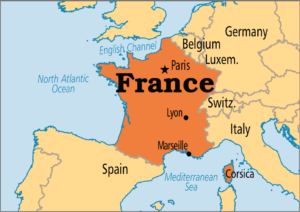
French Republic
Europe
Geography
Area: 543,965 sq. km
The largest country in Western Europe.
Population: 62,636,580 Annual Growth: 0.53%
Capital: Paris
Urbanites: 77.8%
HDI Rank: 8 of 182 (UN Human Development Reports 2009)
Peoples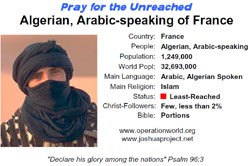
Peoples: 101 (33% unreached) All peoples
Unreached Peoples Prayer Card
Official language: French. Regional languages in decline. French is the first language of 136 million people worldwide Languages: 62 All languages
Religion
Largest Religion: Christian
|
Religion |
|
Pop % |
Ann Gr |
|
38,296,005 |
61.14 |
-0.6 |
|
|
603,192 |
1.0 |
2.4 |
Challenges for Prayer
The accelerating decline of religious faith since the 18th Century has seen France’s Catholic and mainline Protestant legacies plummet in recent years, even as atheism has grown. Hostility toward organized religion as well as the privatization of spirituality mean that regular attendance in any church is below 8%. Some surveys show that over 30% of French people are non-religious. Most French have a profound ignorance of, or indifference to, the gospel, many having never meaningfully encountered it. Yet, the relativism of postmodernity has generated acute emptiness and existential angst; as many have noted, this in turn has created a spiritual hunger that has grown rapidly in recent years. Pray that such hunger might overcome the suspicion toward religion. Pray that Christians would be prepared to patiently and relationally share Jesus with those who seek.
Protestants were accepted at the Reformation, and at one stage some estimate that up to 25% of the French population had embraced the new teaching. But persecution (from the mid-16th Century until the late 18th Century), humanism and nominalism (in the last 200 years) have reduced this to 1.9% in 2010. Protestantism – though widely respected – is spiritually compromised by liberal theology, universalism and the acceptance of contradictory doctrinal and ethical views. Protestants are more numerous in Alsace and the south, but nominalism and decline are common. Yet there are staunch evangelical believers in most Reformed and Lutheran congregations. Pray for restoration to the faith and commitment shown by their martyr forebears.
PRAYER: Father, thank You for opening our eyes and enabling us to behold wonderful things in Your law. We behold Him who is called Wonderful Counselor, Mighty God, and Everlasting Father, for He communicates to us who live in time and space, the truth about Who You are. We behold in Jesus, one who is greater than David, for He is the Prince of Peace. He is the heavenly bridegroom for Whom, we His bride are preparing to meet face to face. We are grateful for this new covenant which enables us to be ready for Him, to have His law of life written on our hearts. Free our souls from clinging to the dust of earthly things. Energize our spiritual faculties to set our affections on things above. In Jesus’ Name. Amen.
Pastor David
